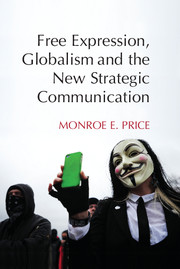Book contents
- Frontmatter
- Contents
- Acknowledgments
- 1 Moving the Needle, Filling the Streets
- 2 Strategic Communication and the Foundations of Free Expression
- 3 Narratives of Legitimacy
- 4 Strategies of the Diagnostic
- 5 Asymmetries and Strategic Communication
- 6 Strategies of System Architecture
- 7 Soft Power, Soft War
- 8 Religions and Strategic Communication
- 9 Regulating NGOs in the Market for Loyalties
- 10 Strategic Platforms
- 11 Strategic Communication and Satellite Channels
- 12 Strategies of Closure, Markers of Anxiety
- Bibliography
- Index
- References
1 - Moving the Needle, Filling the Streets
Published online by Cambridge University Press: 18 December 2014
- Frontmatter
- Contents
- Acknowledgments
- 1 Moving the Needle, Filling the Streets
- 2 Strategic Communication and the Foundations of Free Expression
- 3 Narratives of Legitimacy
- 4 Strategies of the Diagnostic
- 5 Asymmetries and Strategic Communication
- 6 Strategies of System Architecture
- 7 Soft Power, Soft War
- 8 Religions and Strategic Communication
- 9 Regulating NGOs in the Market for Loyalties
- 10 Strategic Platforms
- 11 Strategic Communication and Satellite Channels
- 12 Strategies of Closure, Markers of Anxiety
- Bibliography
- Index
- References
Summary
Governments rise and fall, strengthen and weaken, in part because of their control of information flows. Militaries shift their attention increasingly to the impact of the media on their missions. Corporations prosper and blossom or are destroyed and wither depending on their mastery of the changed information technologies. Civil society follows suit. New modes of affecting opinion, mobilizing populations and extending influence are developed, tested and measured for effectiveness. This race for new means for reaching populations – and the rise of new modes for assessing, influencing and regulating persuasion – becomes a massive exercise in what one might call “the new strategic communication,” one that is persuasive and encompasses disruptive technologies for reception and pervasive technologies for surveillance. We have always had strategic communication. But the combination of new technologies, new tools of surveillance and new techniques for analysis of ever more available data raises the consequences and possibilities of strategic communication to new levels. And the structure, ubiquity and potency of strategic communication accentuate concerns about the relevance of existing norms and institutions, the existing underpinnings and foundations for thinking about freedom of expression.
In a world of totalizing capacities to collect and analyze data, old views of what constitutes “autonomy” or what constitutes privacy have a quaint, reality-denying, archaic quality. The president of Brazil, in an immediate reaction to disclosures that conversations among her government officials or national leaders in Latin America were monitored, called for a redesign of the Internet to prevent key messages from necessarily being transported through servers under U. S. jurisdiction. The recognition seemed palpable that an observed society, whether observed by one’s own government or a foreign one, will behave and speak differently from one that is unmonitored.
- Type
- Chapter
- Information
- Publisher: Cambridge University PressPrint publication year: 2014



